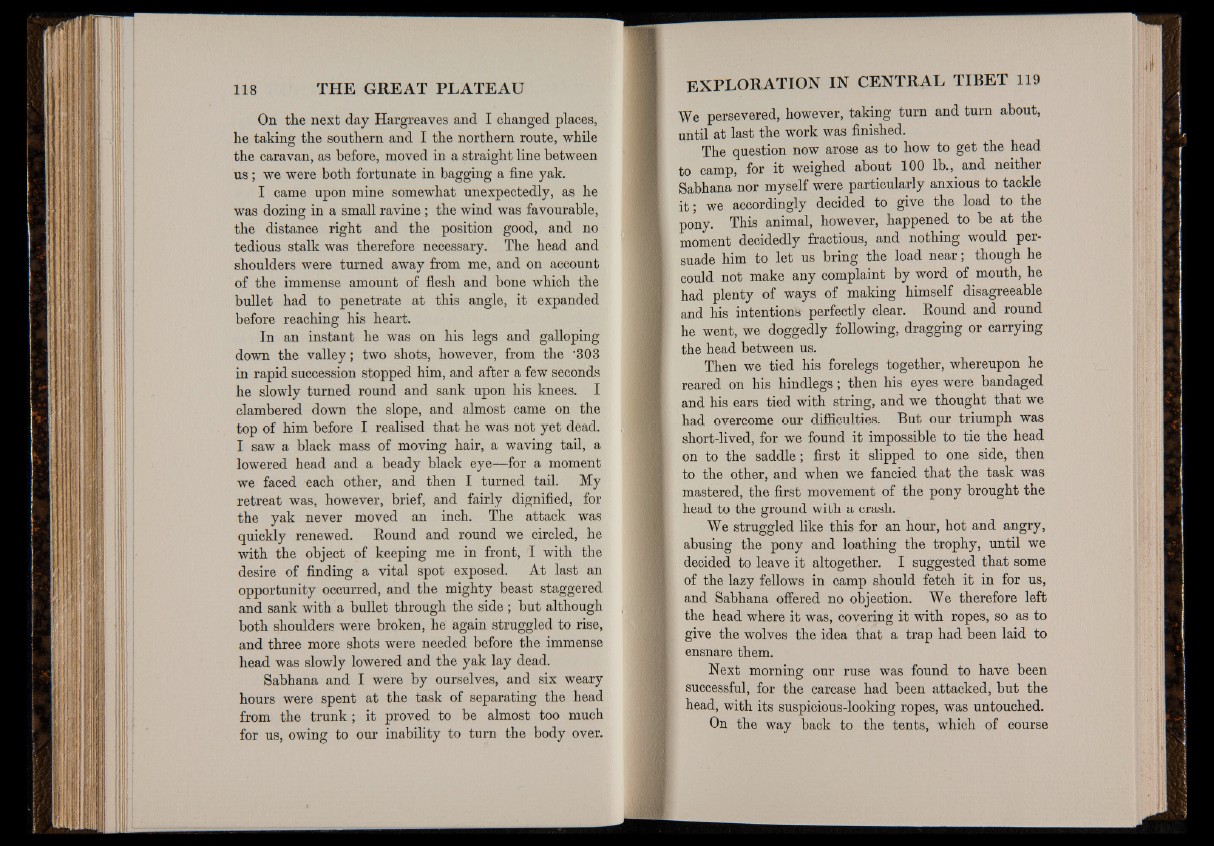
On the next day Hargreaves and I changed places,
he taking the southern and I the northern route, while
the caravan, as before, moved in a straight line between
u s ; we were both fortunate in bagging a fine yak.
I came upon mine somewhat unexpectedly, as he
was dozing in a small ravine ; the wind was favourable,
the distance right and the position good, and no
tedious stalk was therefore necessary. The head and
shoulders were turned away from me, and on account
of the immense amount of flesh and bone which the
bullet had to penetrate at this angle, it expanded
before reaching his heart.
In an instant he was on his legs and galloping
down the valley; two shots, however, from the *303
in rapid succession stopped him, and after a few seconds
he slowly turned round and sank upon his knees. I
clambered down the slope, and almost came on the
top of him before I realised that he was not yet dead.
I saw a black mass of moving hair, a waving tail, a
lowered head and a beady black eye—for a moment
we faced each other, and then I turned tail. My
retreat was, however, brief, and fairly dignified, for
the yak never moved an inch. The attack was
quickly renewed. Round and round we circled, he
with the object of keeping me in front, I with the
desire of finding a vital spot exposed. At last an
opportunity occurred, and the mighty beast staggered
and sank with a bullet through the side ; but although
both shoulders were broken, he again struggled to rise,
and three more shots were needed before the immense
head was slowly lowered and the yak lay dead.
Sabhana and I were by ourselves, and six weary
hours were spent at the task of separating the head
from the tru n k ; it proved to be almost too much
for us, owing to our inability to turn the body over.
We persevered, however, taking turn and turn about,
until at last the work was finished.
The question now arose as to how to get the head
to camp, for it weighed about 100 lb., and neither
Sabhana nor myself were particularly anxious to tackle
i t ; we accordingly decided to give the load to the
pony. This animal, however, happened to be at the
moment decidedly fractious, and nothing would persuade
him to let us bring the load near; though he
could not make any complaint by word of mouth, he
had plenty of ways of making himself disagreeable
and his intentions perfectly clear. Round and round
he went, we doggedly following, dragging or carrying
the head between us.
Then we tied his forelegs together, whereupon he
reared on his hindlegs; then his eyes were bandaged
and his ears tied with string, and we thought that we
had overcome our difficulties. But our triumph was
short-lived, for we found it impossible to tie the head
on to the saddle; first it slipped to one side, then
to the other, and when we fancied that the task was
mastered, the first movement of the pony brought the
head to the ground with a crash.
We struggled like this for an hour, hot and angry,
abusing the pony and loathing the trophy, until we
decided to leave it altogether. I suggested that some
of the lazy fellows in camp should fetch it in for us,
and Sabhana offered no objection. We therefore left
the head where it was, covering it with ropes, so as to
give the wolves the idea that a trap had been laid to
ensnare them.
Next morning our ruse was found to have been
successful, for the carcase had been attacked, but the
head, with its suspicious-looking ropes, was untouched.
On the way back to the tents, which of course